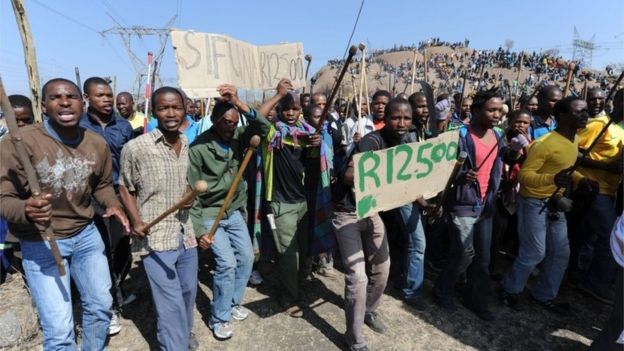South Africa's police chief has criticised a judge-led inquiry which blamed her officers for the killing of 34 miners in what became known as the Marikana massacre.
Riah Phiyega said police management did not have "murderous intent" on the day the striking miners were shot in 2012.
It was the deadliest police action in democratic South Africa.
President Jacob Zuma is under pressure to sack Ms Phiyega following the findings of the inquiry.
She has until Friday to inform him why she should keep her job, reports the BBC's Pumza Fihlani from the main city, Johannesburg.
Her allies see this as a slap in the face, and believe she is being unfairly targeted, our reporter adds.
'Testing situation'
After listening to evidence for some 300 days, Judge Ian Farlam recommended, in a report released last month, that police should face a criminal investigation over the killings and another inquiry should be set up to determine Ms Phiyega's fitness for office.

The workers were killed while striking for higher wages at the Marikana platinum mine owned by UK-based firm Lonmin.
In a statement, Ms Phiya said the Farlam-led inquiry had failed to give enough attention to the "testing public order situation" that police had faced.
Ten people, including policemen and guards, had been killed in the days leading up to police opening fire on the striking workers, she said.
"There was very little focus by the commission and the commentators, unfortunately, on the 10 deaths," Ms Phiyega said.
Violence could not be tolerated during strikes, she added.
"The carrying of dangerous weapons must be condemned. And those strikers who carry these weapons during strikes must be exposed and brought to account," Ms Phiyega said.
"Dealing with all of these things needs the active participation of the communities, labour unions, the media and NGOs. It cannot be left up to the police alone to ensure that strikes are free from violence."
Latest Stories
-
Kwesi Nyantakyi Esq: How the new Ministry for Sports & Recreation can transform the Youth of Ghana
2 hours -
Barca fights back to beat Real Madrid 5-2 for Spanish Super Cup success
3 hours -
Photos: Mahama joins National Prayer and Thanksgiving Service
3 hours -
Mahama reaffirms commitment to education reform, tackles immediate feeding challenges in SHSs
3 hours -
Vetting of ministerial nominees begins on Monday, January 13
4 hours -
Ghanaian, Prof Wisdom Tettey is Carleton University’s 17th President and Vice-Chancellor in Canada
4 hours -
National Cathedral can be built at a reasonable cost without state funds – Mahama
5 hours -
13-year-old girl survives alleged ritual murder attempt in Eastern Region
5 hours -
Anti-corruption campaigner lauds ORAL, commends Mahama
5 hours -
Türkish Ambassador to Ghana congratulates Vice President Opoku-Agyemang
5 hours -
GUTA dissociates itself from its president’s comment urging gov’t to retain E-levy
5 hours -
My victory is the manifestation of the will of God, says Mahama
5 hours -
We’ll strengthen the fight against corruption – Mahama
5 hours -
National Cathedral project expenditure to be probed soon – Mahama
5 hours -
Senyo Amponsah thrills audience at ‘Dzidudua’ concert
6 hours

